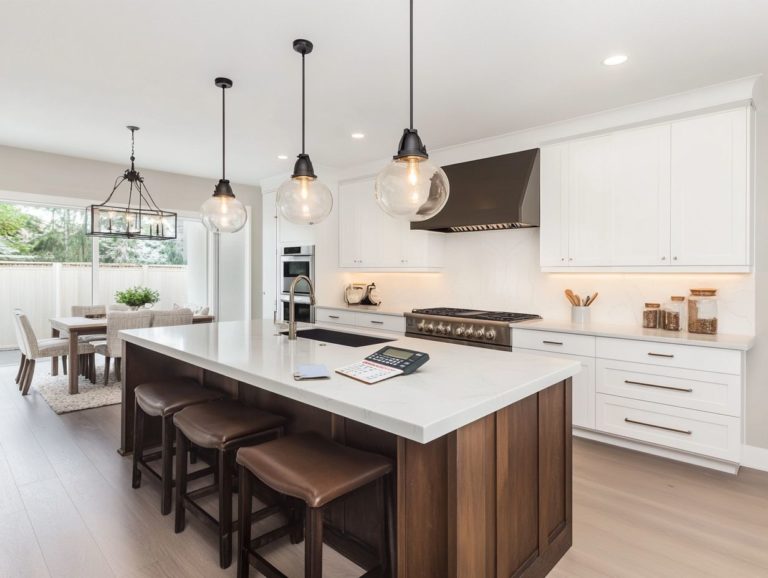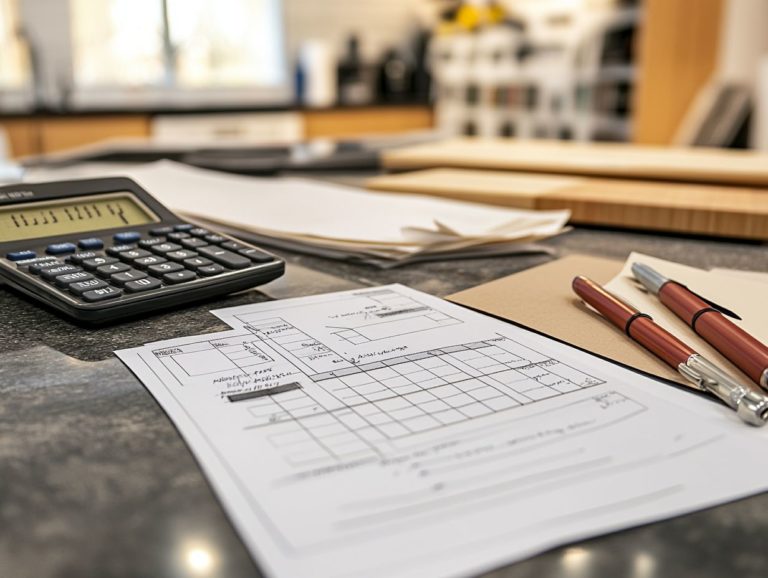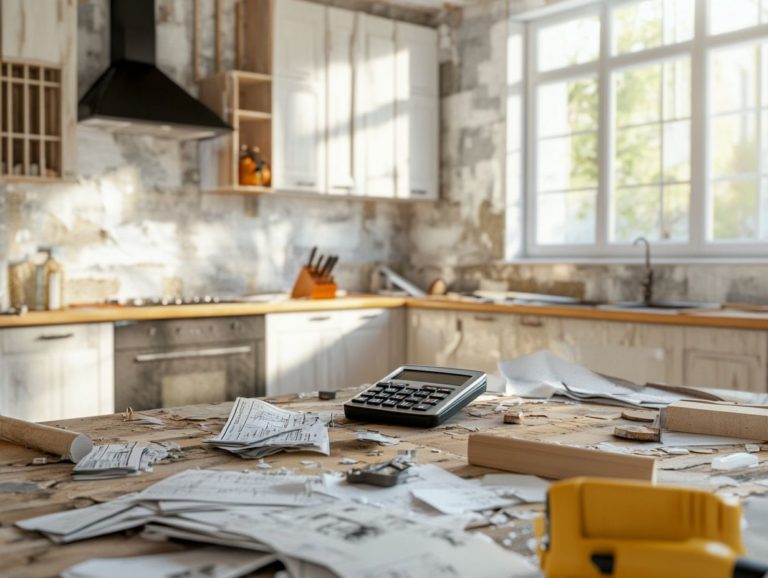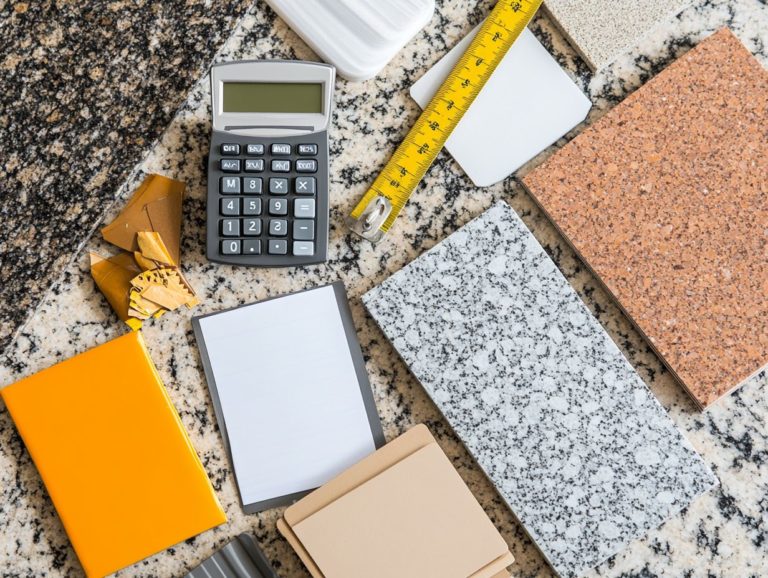5 Budgeting Strategies for Kitchen Renovations
Planning a kitchen renovation can be exhilarating yet daunting. Managing your budget is key to a successful project.
With costs rising and choices seeming endless, it’s crucial to keep your finances on track. This article covers five effective budgeting strategies to help you navigate your renovation without overspending.
From establishing a realistic budget to exploring DIY options, you’ll find invaluable tips that save you money and bring your dream kitchen to life.
This article also highlights common pitfalls to avoid and innovative ways to stretch your renovation budget. Dive in to discover how to achieve the kitchen of your dreams while keeping your finances in check!
Contents
- Key Takeaways:
- 1. Set a Realistic Budget
- 2. Prioritize Your Needs and Wants
- 3. Consider DIY Options
- 4. Shop Around for the Best Deals
- 5. Don’t Be Afraid to Compromise
- What Are the Average Costs of a Kitchen Renovation?
- Frequently Asked Questions
- What are the top 5 budgeting strategies for kitchen renovations?
- How can I set a realistic budget for my kitchen renovation?
- What should I prioritize when budgeting for my kitchen renovation?
- How can I save money on materials for my kitchen renovation?
- Is it possible to complete a kitchen renovation on a tight budget?
- Should I hire a professional or do a DIY kitchen renovation to save money?
Key Takeaways:
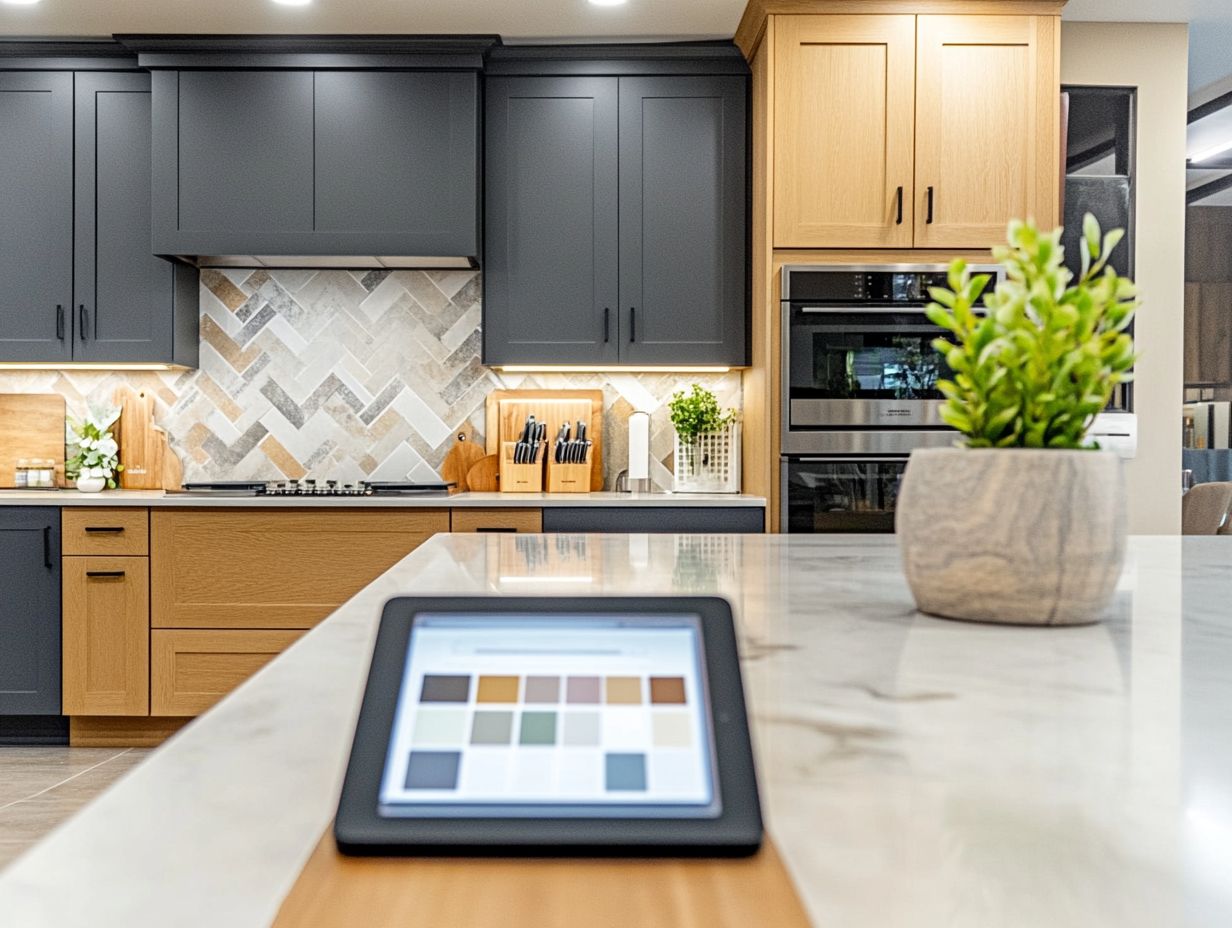
Set a realistic budget to avoid overspending and plan for unexpected costs.
Prioritize your needs and wants to make informed decisions and avoid unnecessary expenses.
Consider DIY options for smaller projects to save on labor costs.
1. Set a Realistic Budget
Setting a realistic budget is crucial for a successful kitchen remodel. It helps you allocate funds for materials, labor, and unexpected issues.
Break down your budget into categories like materials and labor to gain clarity on spending. Be prepared for costs related to cabinets, countertops, or plumbing changes that can affect your overall budget.
To draft an effective plan, prioritize needs vs. wants, consult professionals for estimates, and create a buffer for unforeseen expenses. Keeping a detailed spreadsheet can help you track spending and keep the project within budget.
2. Prioritize Your Needs and Wants
When renovating, it’s essential to prioritize your needs and desires. This clarity guides decisions about fixtures and cabinetry that align with your design goals.
Understand the difference between necessary renovations, like plumbing upgrades, and decorative choices, such as trendy tiles. Clearly define these priorities to focus your budget on structural integrity and usability first.
This approach ensures you address the most critical aspects first, preventing overspending on visual elements that may not enhance efficiency or value.
3. Consider DIY Options
Exploring DIY options can significantly reduce your renovation costs. It allows you to make affordable changes and enjoy the satisfaction of your hard work.
Simple tasks like painting cabinets or installing laminate flooring can be done over a weekend. Check local hardware stores for budget-friendly supplies, as many offer DIY workshops to guide you.
This hands-on approach will transform your kitchen and reflect your unique style!
4. Shop Around for the Best Deals
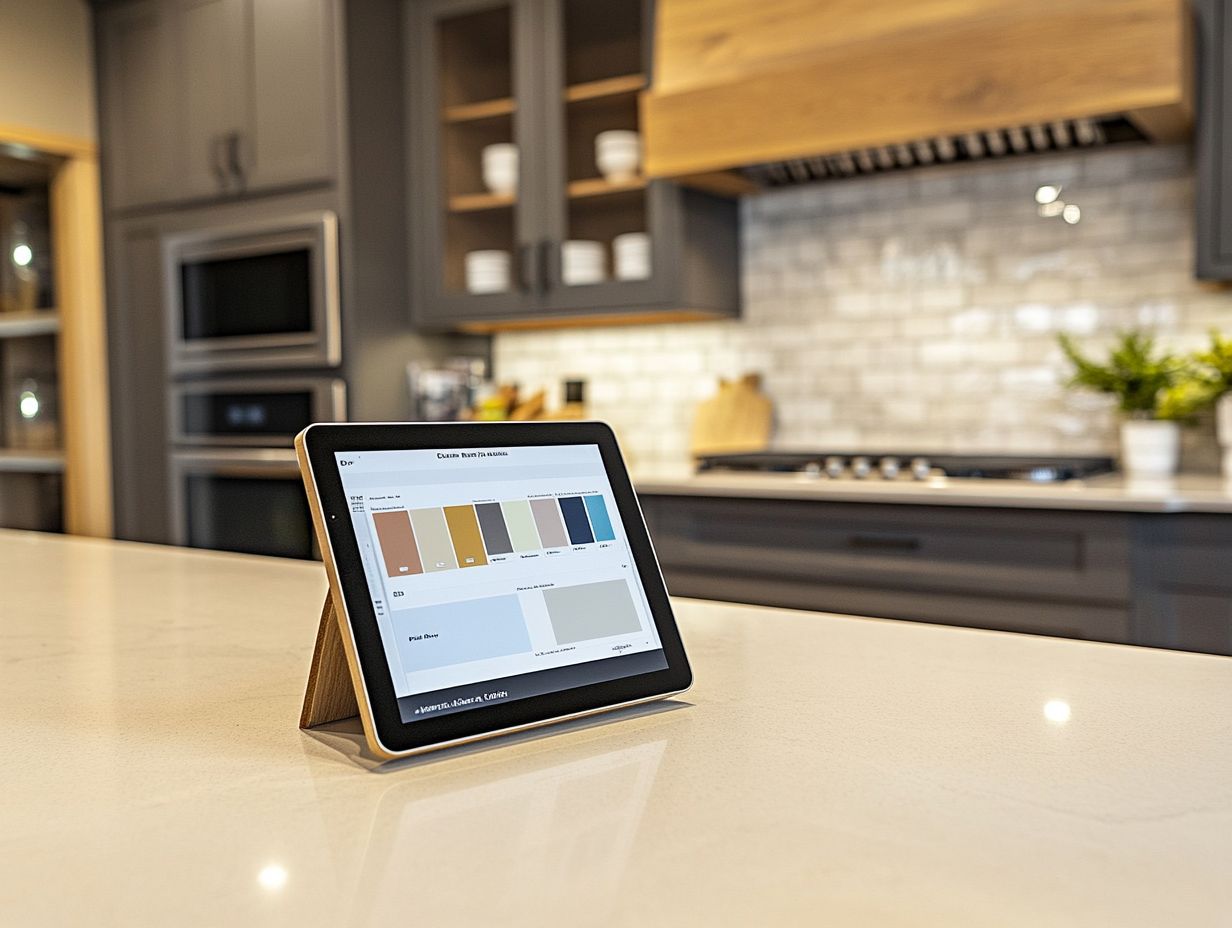
Shopping around for the best deals on refurbished materials can lower your kitchen renovation costs.
This is especially true for expensive items like countertops and flooring.
Explore various retailers and online platforms to find budget-friendly options.
These options should meet your style and functional needs.
Comparing prices helps you find the best deals and discover discounts.
Don’t forget local salvage yards or second-hand shops; they often have high-quality materials at lower prices.
Focus on quality over brand names to find delightful options that elevate your kitchen within budget.
5. Don’t Be Afraid to Compromise
Your willingness to compromise can create a stunning kitchen without overspending.
This strategy allows for smart choices that enhance your kitchen’s appeal.
Evaluate which areas need high-end finishes and where budget options can excel.
For example, attractive yet affordable countertops can offer style without stretching your wallet.
Focus on cohesive design elements like cabinetry and lighting for a significant impact.
With a well-thought-out design, you can enjoy a luxurious-looking kitchen achieved through smart material choices.
What Are the Average Costs of a Kitchen Renovation?
Knowing the average costs of a kitchen renovation is vital for homeowners.
This knowledge helps you create a budget that fits your needs.
Typical costs include appliances, cabinetry, countertops, flooring, and labor.
Each element varies based on material choices, design complexity, and regional market conditions.
High-end appliances and custom cabinetry raise your total costs.
On the flip side, budget-friendly options can save you money.
Labor costs also depend on location; urban areas usually have higher rates.
This variability can significantly affect your renovation budget.
What Factors Can Affect the Cost of a Kitchen Renovation?
Many factors affect your kitchen renovation costs, such as material choices, labor expenses, and unexpected issues.
The condition of existing fixtures is also important; outdated elements may need costly repairs or replacements.
The scope of your project is crucial. A simple cabinetry refresh differs greatly from a complete overhaul in terms of budget.
Do not overlook your location; areas with higher living costs often see increased labor and material prices.
By considering these factors, you can better align your renovation goals with your budget.
How Can You Save Money on Materials and Labor?
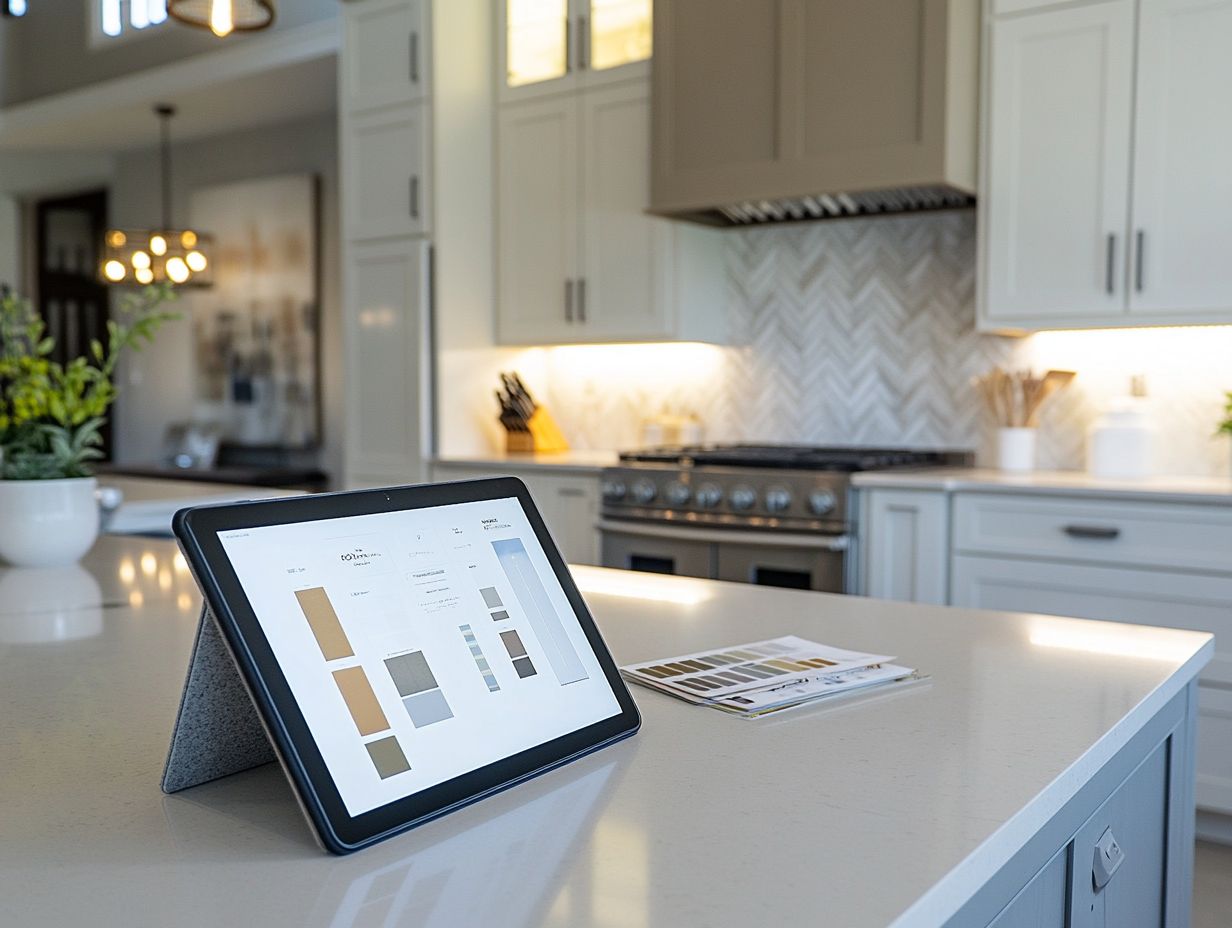
Saving money on materials and labor during your kitchen renovation is within reach when you plan strategically and embrace cost-effective changes! Engage in DIY projects that utilize affordable resources.
Explore local suppliers; you might stumble upon discounted materials or remnants from larger projects! These can be creatively repurposed to enhance your space.
When discussing renovation plans with contractors, approach negotiations thoughtfully. Consider not only the price but also the timeline and the scale of the work involved.
If you’re feeling adventurous, tackle smaller tasks on your own—like painting cabinets or installing shelves. This can drastically cut down on labor costs while adding your unique flair to your home!
This blend of savvy shopping and hands-on effort can lead to substantial savings, making your dream kitchen more attainable than you think.
What Are Some Common Budgeting Mistakes to Avoid?
Avoiding common budgeting mistakes is crucial for your kitchen renovation. These pitfalls can lead to overspending and unexpected issues that can throw your planning process off course!
When you embark on such a significant project, estimate costs accurately instead of relying on overly optimistic figures! Many homeowners overlook expenses related to materials, labor, and permits, causing their budget to spiral out of control.
Failing to account for unexpected costs—like sudden price increases or unforeseen structural repairs—can create financial strain. Effective planning should include setting aside money for unexpected costs and obtaining detailed quotes from various contractors.
Focus on careful budgeting and craft an adaptable financial plan. This way, you can navigate your kitchen renovation with greater confidence and achieve your desired outcomes without breaking the bank!
How Can You Stick to Your Budget During the Renovation Process?
Sticking to your budget during a kitchen renovation requires diligent expense tracking and a clearly defined budget breakdown. Highlight potential unexpected issues before they arise!
To manage spending effectively, regularly review your budget and compare projected costs against actual expenses. Set aside a contingency fund—typically around 10-20% of your total budget—to cover any unforeseen expenses that may crop up during the project.
Stay flexible to make adjustments when needed. This may mean re-evaluating material choices or postponing certain aspects of the project until funds are available.
By maintaining this proactive attitude, you can ensure a smoother renovation experience and sidestep the stress of overspending!
What Are Some Creative Ways to Save Money on a Kitchen Renovation?
Explore creative ways to save money on your kitchen renovation! This can lead to financial savings and unique design solutions.
Think outside the box to transform your vision into reality without breaking the bank. For instance, upcycle existing materials for a fun and sustainable kitchen makeover! Repurpose old cabinets or drawers with fresh paint and new hardware for amazing results.
Participate in local community swaps to uncover hidden gems among your neighbors. You might trade unwanted items for something fresh! Don’t overlook online marketplaces; dive into their offerings to discover budget-friendly finds—unique decor or gently used appliances await to elevate your kitchen aesthetic.
Frequently Asked Questions
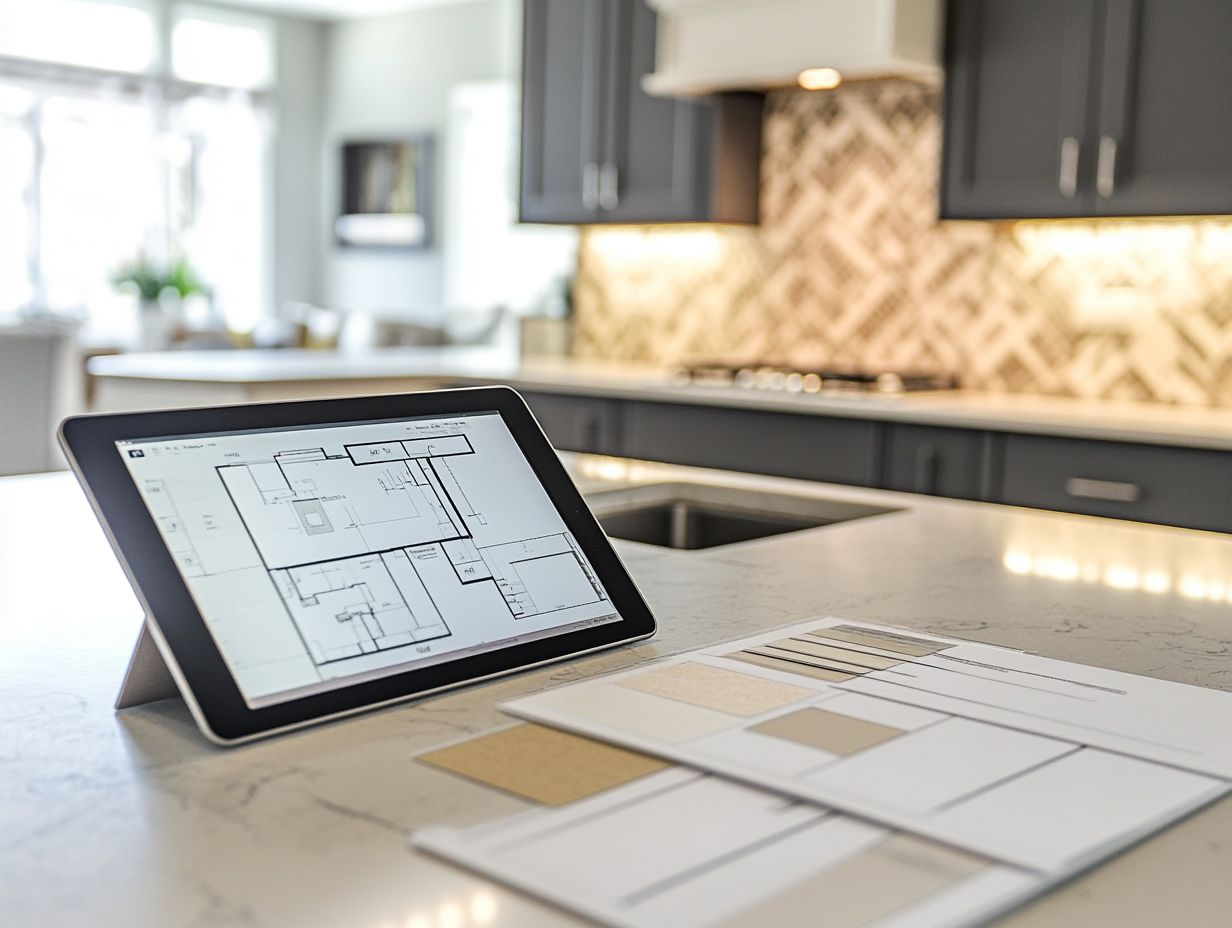
What are the top 5 budgeting strategies for kitchen renovations?
- Set a realistic budget.
- Prioritize the most important changes.
- Opt for cost-effective materials.
- Consider DIY options.
- Shop around for deals and discounts!
How can I set a realistic budget for my kitchen renovation?
First, figure out your total budget. Then, break it down into categories like labor, materials, and unexpected costs.
Check the average costs of similar renovations in your area to help you stay on track.
What should I prioritize when budgeting for my kitchen renovation?
Focus on the essential upgrades first. Replace outdated appliances or fix structural issues to make the most impact.
This way, you spend your money wisely and avoid splurging on less important upgrades.
How can I save money on materials for my kitchen renovation?
Choose budget-friendly options like laminate countertops instead of granite. Consider vinyl flooring instead of hardwood.
Always look for sales, discounts, and clearance items to stretch your budget further.
Is it possible to complete a kitchen renovation on a tight budget?
Absolutely! You can renovate on a tight budget by setting a clear plan and prioritizing essential changes.
Find cost-effective materials and explore DIY options to save money without sacrificing quality.
Should I hire a professional or do a DIY kitchen renovation to save money?
This depends on your skills and experience. If you’re handy, a DIY project can save you cash.
For more complex tasks, hiring a pro is a smart choice to avoid costly mistakes.
